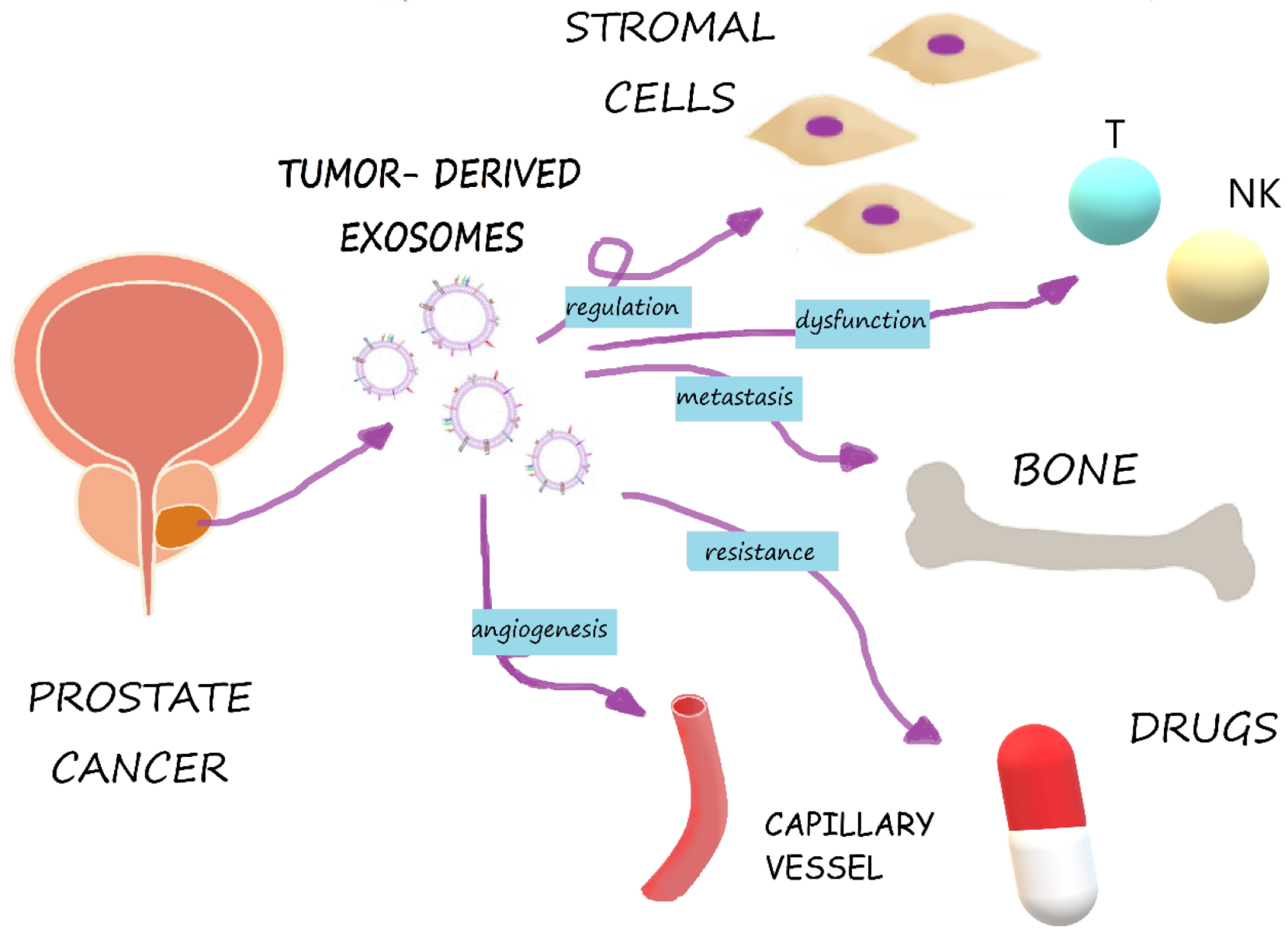Prostate Cancer Exosome Research Service
- RNA-seq or qPCR for miRNA, lncRNA, or mRNA
- Mass spectrometry-based proteomics (e.g., Orbitrap LC-MS/MS)
- Lipidomics and metabolomics if needed
- Isolated Exosomes: ≥200 μg total protein or ≥100 μL in PBS
- Cell Culture Supernatants: ≥5 mL per sample
- Plasma/Serum: ≥2 mL per sample
- Urine: ≥ 10 mL per sample
- Other Body Fluids: Please inquire for specific requirements
Prostate cancer (PCa) is the most frequently diagnosed malignancy among men and remains a leading cause of cancer-related mortality worldwide. It encompasses a broad clinical spectrum ranging from indolent, organ-confined tumors to aggressive, treatment-resistant metastatic disease. Despite advances in diagnostics and therapeutic interventions, significant challenges persist in early detection, risk stratification, and management of disease progression, particularly in the context of castration-resistant prostate cancer (CRPC). A deeper understanding of the molecular and cellular mechanisms underlying PCa development and therapeutic resistance is urgently needed to improve patient outcomes.
In prostate cancer, exosomes contribute to tumorigenesis and disease progression through multiple mechanisms. Exosomes in the prostate tumor microenvironment are secreted by a wide variety of cells, including prostate epithelial cells, cancer-associated fibroblasts, endothelial cells, and immune cells. These exosomes carry a diverse cargo, including proteins, lipids, and nucleic acids, which reflect the physiological and pathological states of their parent cells. Exosomes mediate intercellular communication by transferring oncogenic molecules that enhance proliferation, angiogenesis, and epithelial-to-mesenchymal transition (EMT). Exosomes are also implicated in preparing the pre-metastatic niche, particularly in bone tissue, by modulating the immune environment and altering stromal architecture. Furthermore, they play a key role in therapy resistance by transporting androgen receptor variants and other survival-promoting factors that attenuate the efficacy of androgen deprivation therapy and chemotherapeutic agents.

Figure 1. Role of Prostate Cell-Derived Exosomes in Cancer Progression
Service at MtoZ Biolabs
Given their stability in body fluids such as plasma, urine, and seminal fluid, exosomes offer a minimally invasive source for biomarker discovery and disease monitoring. They hold promise not only as diagnostic and prognostic tools but also as vehicles for therapeutic delivery. To support this rapidly evolving field, MtoZ Biolabs provides a comprehensive Prostate Cancer Exosome Research Service. Our integrated Prostate Cancer Exosome Research Service platform combines advanced exosome isolation and multi-omics analysis with functional validation to help researchers dissect the complex roles of exosomes in prostate cancer biology and therapeutic response.
Our services include:
💠Exosome isolation and purification
💠Exosome Identification (size, morphology, marker expression)
💠Exosome labeling and tracking
💠Multi-omics analysis of exosomes (proteomics, transcriptomics, lipidomics, metabolomics)
💠Exosome functional assays (in vitro and in vivo)
Analysis Workflow
1. Sample Collection and Quality Control
We accept biofluids (e.g., urine, plasma, serum), tissue lysates, or conditioned media from prostate cancer models. Each sample undergoes rigorous quality assessment for integrity, volume, and compatibility.
2. Exosome Isolation and Purification
Exosomes are enriched using ultracentrifugation, size exclusion chromatography, or immunoaffinity methods, depending on the sample type and downstream analysis requirements.
3. Exosome Characterization
We perform nanoparticle tracking analysis (NTA), transmission electron microscopy (TEM), and Western blotting for markers such as CD63, CD9, and TSG101 to confirm the identity and purity of isolated vesicles.
4. Molecular Cargo Profiling
Exosomal nucleic acids and proteins are extracted and analyzed using:
5. Functional Assays
In vitro assays assess effects on cell proliferation, migration, invasion, and immune modulation. In vivo models evaluate tumor growth, metastasis, and drug resistance mediated by exosomes.
6. Data Integration and Bioinformatics
All multi-omics data are subjected to advanced bioinformatics analyses, including pathway enrichment, differential expression analysis, and target prediction to extract biological meaning.
7. Reporting and Interpretation
A comprehensive, customized report is generated, including methodology, raw and processed data, visualizations (e.g., heatmaps, volcano plots), and biological interpretation with prostate cancer relevance.
Service Advantages
☑️Advanced Analytical Platforms: We leverage cutting-edge technologies including mass spectrometry, next-generation sequencing, NTA, and TEM to ensure comprehensive and high-resolution exosome profiling.
☑️Experienced Scientific Team: Our team of exosome specialists and cancer biologists brings deep expertise in prostate cancer research, enabling precise experimental design and data interpretation.
☑️Customizable Solutions: From early discovery to translational applications, our services are fully tailored to your study goals, biological models, and target molecules.
☑️Strict Quality Control: All procedures are conducted under rigorous SOPs using validated reagents, ensuring high reproducibility, data accuracy, and regulatory compliance.
Applications
Our Prostate Cancer Exosome Research Service supports a wide range of research applications across basic, translational, and clinical prostate cancer studies, including:
1️⃣Biomarker Discovery: Identification of exosomal proteins and nucleic acids for early detection, prognosis, and therapeutic response monitoring.
2️⃣Tumor Microenvironment Studies: Investigation of exosome-mediated communication between prostate cancer cells and stromal or immune cells.
3️⃣Mechanisms of Drug Resistance: Exploration of how exosomes contribute to therapy resistance through cargo-mediated signaling pathways.
4️⃣Metastasis and Invasion Analysis: Analysis of exosomal molecules that facilitate prostate cancer cell migration, invasion, and metastatic niche formation.
5️⃣Therapeutic Target Identification: Profiling of exosomal content to discover novel intervention targets or monitor treatment efficacy.
Sample Submission Suggestions
We accept the following sample types:
Samples should be stored at -80°C and shipped on dry ice. Avoid repeated freeze–thaw cycles.
*Please consult us for tailored collection and storage protocols to maximize data quality.
Deliverables
1. Comprehensive experimental details (materials, instruments, and methods)
2. Raw data
3. Processed omics data files
4. Quality control reports (NTA, Western blot, TEM images)
5. Functional assay results
6. Bioinformatics analysis
7. Customized report based on project requirements
Our Prostate Cancer Exosome Research Service is designed to provide more rapid, high-throughput, and cost-effective analysis, with exceptional data quality and minimal sample consumption. Free project evaluation, welcome to learn more details.
Related Services
Pancreatic Cancer Exosome Research Service
Breast Cancer Exosome Research Service
Exosome-Based Drug Delivery Service
Exosome Antibody Development Service
How to order?







